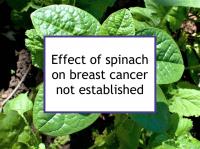Like beets and Swiss chard, spinach (Spinacia oleracea) belongs to the amaranth family. It is a good source of alpha-lipoic acid, beta-carotene, folate, and vitamin K, and contains cadmium, iron, manganese and magnesium. Spinach also incorporates cinnamic acid, lutein and a variety of lignans, chlorophylls, and glycolipids.
Spinach has been shown to have anti-inflammatory, antioxidant, neuroprotective, and antimutagenic properties, and to protect the eyes from macular degeneration and cataracts. Spinach components have been shown to inhibit growth and proliferation of cervical cancer cells in the laboratory and carcinogen-induced colon cancer in mice. Dietary intake of spinach has been found to be associated with lower risks of head and neck, lung, gallbladder, stomach, liver, bladder, prostate and ovarian cancer in population studies.
Breast cancer-related effects of eating spinach
Carotenoids and glycolipids isolated from spinach have been demonstrated to cause dose-dependent growth inhibition in breast cancer cells. Several population studies have found that spinach consumption is associated with lower risk of breast cancer. Spinach consumption may help counteract the cancer-promoting effects of the heme iron in red meat.
Additional comments
Baby spinach has higher flavonoid concentration than mature spinach. Red spinach (Amaranthus gangeticus) is a plant used in South Asian cooking that is closely related to common spinach. Based on the few studies that have been performed, red spinach appears to have anti-cancer activities similar to that of common spinach.
Although spinach typically incorporates a significant level of calcium, spinach is also an abundant source of oxalate, which interferes with calcium absorption. Therefore spinach should not be eaten at the same time as calcium-rich foods by breast cancer patients and others to whom calcium levels are important. Oxalate can also contribute to calcium oxalate kidney stones in susceptible individuals. Breast cells can also accumulate oxalate, resulting in calcium oxalate microcalcifications. While one study reported that oxalate appears to promote the transformation of breast cells from normal to cancer cells, this has not been confirmed. Boiling reduces the oxalate content of spinach and increases iron availability.
Non-organic spinach must be washed very thoroughly to remove pesticide residue as much as possible.
Sources of information in this webpage
The information above, which is updated continually as new research becomes available, has been developed based solely on the results of academic studies. Clicking on any of the underlined terms will take you to its tag or webpage, which contain more extensive information.
Below are links to 20 recent studies concerning this food and its components. For a more complete list, including less recent studies, please click on spinach.
